Femia > Health Library > Being a mom > Recovering from birth > Postpartum hemorrhoids: Causes, treatment, and tips for healing after childbirth
Postpartum hemorrhoids: Causes, treatment, and tips for healing after childbirth
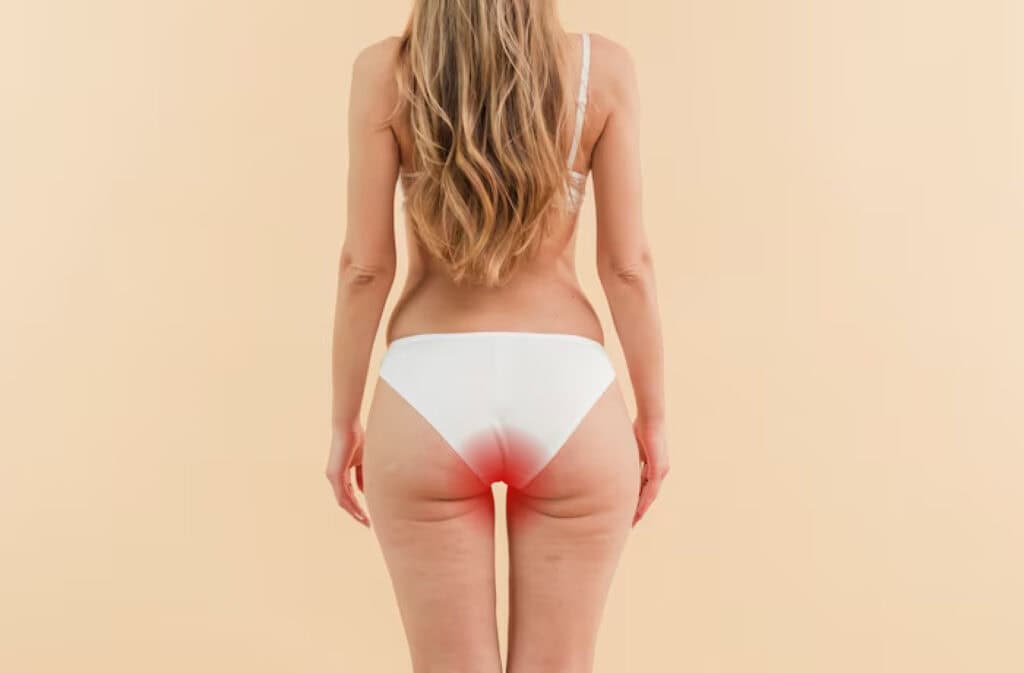
- Updated Feb 10, 2025
- Published
CRAFTED BY HUMAN
Crafted by human At Femia, we provide accurate and up-to-date information at every stage of your journey, from trying to conceive, pregnancy and postnatal support. All content is created by a real person based on in-depth research and own professional experience. Femia ensures that you will receive expert advice, strict accuracy and a personalized approach from our authors/medical experts. Learn more about our editorial policy.
FACT CHECKED
Fact checked At Femia Health, we maintain the highest standards of editorial excellence in delivering content focused on helping you conceive, guiding you through pregnancy, and supporting you postpartum. Explore our content review principles to learn how we ensure the accuracy and quality of our health and lifestyle tips for every stage of your journey.
- Postpartum hemorrhoids are swollen veins felt either at the surface around your anus or deeper in your rectum. Toward the end of pregnancy, your baby’s weight on your pelvis, constipation, and the process of childbirth are common causes of hemorrhoids after birth.
- Most hemorrhoids heal on their own within 2-6 weeks. Simple at-home treatments like a Sitz bath, ice packs, a high-fiber diet, and witch hazel can help naturally heal postpartum hemorrhoids. Witch hazel works primarily for its local soothing effect, but it does not significantly address the underlying cause of the problem.
- While hemorrhoids typically resolve on their own, in some cases, they may require medical intervention. Your physician can provide personalized care for persistent hemorrhoids.
During labor you might be looking forward to making it to the finish line of pregnancy, however, hemorrhoids are often an inevitable downside of the process. The immense pressure and strain placed on your pelvis while giving birth can result in hemorrhoids postpartum. These are swollen veins which form either around your anus, or deeper in your rectum, or both areas. They can be extremely painful, itchy, and in some instances bleed. While the symptoms can appear daunting, it may be reassuring to know that postpartum hemorrhoids subside on their own within a few weeks of delivery. You can follow a few simple healing tips to speed up the recovery process.
Femia offers personalized insights and helps you stay in control
What are postpartum hemorrhoids?
During both pregnancy and childbirth, your pelvis is under heightened pressure. This causes the veins in your rectum and anus to swell, resulting in postpartum hemorrhoids. While your veins have valves, this uncontrollable pressure weakens them. So along with gravity, it results in the pooling of blood. For some women hemorrhoids persist or worsen from pregnancy into the postpartum phase.
Your chances of developing hemorrhoids postpartum are linked to your number of pregnancies, 37.9% following the first pregnancy, 38.4% with the second, and 40% with the third.
👉Find out more: Swollen feet after birth: When to worry?
Symptoms of hemorrhoids after pregnancy
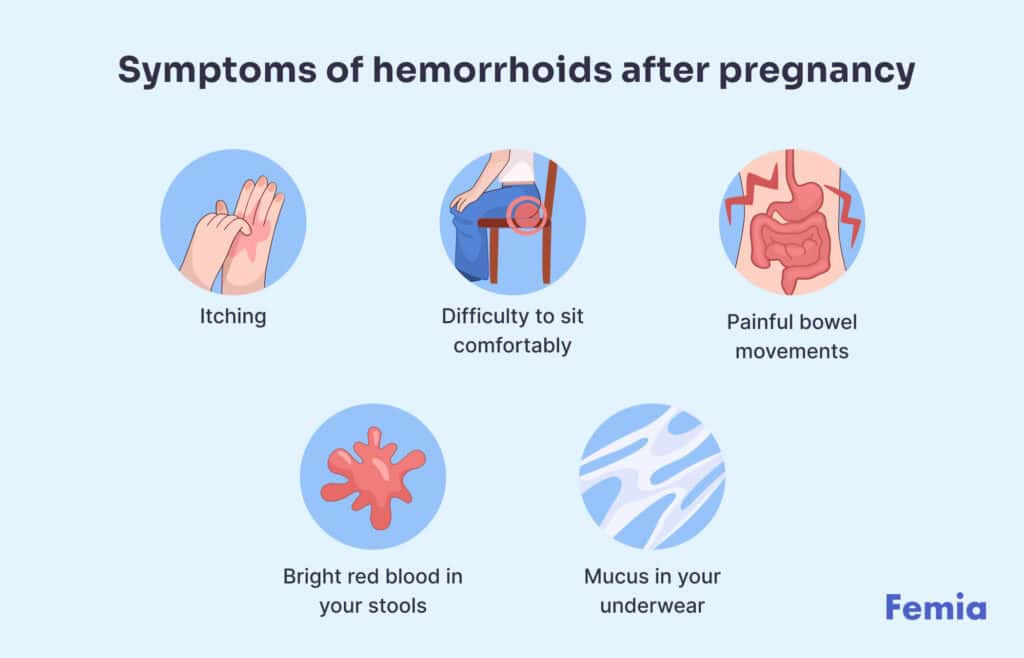
Discovering that you have hemorrhoids after birth can be a great source of discomfort especially since most of the surrounding areas in your pelvis are also sore soon after delivery. Additionally, postpartum hemorrhoids can:
- Sometimes itch
- Make it difficult for you to sit comfortably
- Result in painful bowel movements
- Result in bright red blood with your stools, which can also be a symptom of an anal fissure
- Produce mucus that appears in your underwear
While these symptoms can feel frustrating to deal with initially, it is reassuring to know postpartum hemorrhoids can be easily managed, with recovery taking place in a couple of weeks.
Causes of hemorrhoids after pregnancy
As we have seen, pregnancy on its own is a risk factor for developing hemorrhoids after pregnancy, however, several other factors contribute.
Pregnancy changes
Based on what we have seen, increased pressure in your pelvis is the primary cause of postpartum hemorrhoids. Some of this pressure starts to build up during pregnancy. During pregnancy, blood volume increases by approximately 40-50%, putting extra strain on the venous system and causing blood vessels to swell. Additionally, the growing baby, particularly in the final stages of pregnancy, adds pressure to the lower pelvis, further increasing the likelihood of developing hemorrhoids.
Progesterone, a hormone released during pregnancy, also contributes to the relaxation of smooth muscle, including the walls of veins, which increases the risk of blood stagnation and the formation of hemorrhoidal nodes. Around 25 to 35% of pregnant women develop hemorrhoids, which may continue to persist into the postpartum phase.
Process of childbirth
Next up is the immense pressure from pushing and straining during labor and childbirth. Your chance of developing hemorrhoids increases further if you have a vaginal delivery compared to a C-section. Delivery using instruments such as forceps can also increase pressure around your rectum and anus, compared to a C-section delivery, causing postpartum hemorrhoids. Giving birth to a baby weighing more than 3,800g (8.38 lbs.) also contributes as a risk factor for developing hemorrhoids postpartum.
Constipation
Constipation during and after pregnancy can increase the likelihood of developing postpartum hemorrhoids. Your pregnancy hormones slow down your digestion. Additionally, your growing uterus is also applying pressure to your intestines, slowing down bowel movement further. After delivery, also depending on the medications you receive, constipation can persist. The strain during each bowel movement can worsen existing hemorrhoids.
Moving less, dietary changes, and taking iron supplements increase constipation, further intensifying postpartum hemorrhoids.
How long do hemorrhoids last after birth?
Postpartum hemorrhoids, with their troublesome symptoms, can be quite alarming to encounter soon after delivery. However, just as the swelling in your vagina, perineum, and general pelvic region subsides within a few days to a couple of weeks, similarly your hemorrhoids also will.
Your uterus is decreasing in size, blood volume drastically decreases, and even your constipation might ease up in a few weeks. With the main contributors out of the way, your hemorrhoids after birth should subside. Of course, contributing factors such as the location and severity can delay the healing process, but for the most part, hemorrhoids should improve with time.
While your hemorrhoids may subside a week or so after delivery, pregnancy, and childbirth increase your long-term chances of developing hemorrhoids. So be sure to watch out for signs of return of hemorrhoids in the future.
Hemorrhoids postpartum treatment options
Since most cases of postpartum hemorrhoids subside on their own, only a few interventions will be required to make you feel more comfortable during the healing phase. Here are a few of these at-home treatment options you can attempt to ease your postpartum hemorrhoids.
- Apply a clean ice pack to the affected area to reduce soreness. This will be indicated in your postpartum care routine to speed up perineal healing as well.
- Soak your perineum and anus for some time daily. A warm sitz bath for 10 – 15 minutes a few times a day has been reported to be an extremely effective way to naturally heal hemorrhoids, even superior to hemorrhoid creams available.
- Apply some cool witch hazel to your hemorrhoids. It can be applied on the surface of your ice packs as well before use.
- You will also be prescribed some ibuprofen and hemorrhoid creams to deal with the pain and discomfort. You can request stool softeners to assist with constipation. Use them as prescribed by your doctor.
Hemorrhoids that do not heal on their own within 12 weeks, or have significant complications such as prolapse of your hemorrhoids may require surgical intervention.
How to heal hemorrhoids after delivery naturally?
In addition to these simple add-ons, there are a few postpartum essentials required to help naturally heal your hemorrhoids after pregnancy.
- Listen to your gut and go to the bathroom when you need to. Constipation may plague you for a week or so after delivery, but whenever you have the urge to go, make sure you do, reducing the strain placed on your rectum and anus.
- Maintain optimum hygiene practices such as cleaning well after every bowel movement. Moistened wipes, with water, can help reduce the friction of dry wipes.
- A fiber-rich diet of veggies, beans, legumes, and whole-grain foods can improve your stool quality and its transit through your hemorrhoids.
- A hydrated body heals better, and staying properly hydrated has significant benefits for your bowel movements. It’s recommended to drink at least half a gallon (approximately 8-10 cups) of water per day, depending on your weight.
- Gentle exercises, such as walking, yoga stretches, and deep breathing exercises, can be beneficial for improving circulation and overall recovery postpartum. However, it’s important to consult with your healthcare provider before starting any exercises, especially if you had tears or a cesarean section, as they may impact your recovery. Avoid anything strenuous, as it can worsen hemorrhoids and hinder healing in the early postpartum period.
- Practicing your Kegels (and reverse Kegels) when you are ready can help strengthen pelvic floor muscles, limiting the chances of hemorrhoid prolapse.
👉Find out more: Signs of hormone imbalance after pregnancy: What to expect and when to seek help
Can hemorrhoids become permanent after childbirth?
Most hemorrhoids after pregnancy, as we have seen, subside within a six-week postpartum period. Rarely do hemorrhoids turn chronic.
Many factors can, however, contribute to a slow healing process such as:
- Being overweight
- Constipation
- Medications you might be taking
- Infections
- A low-fiber diet
- Dehydration
- Heavy lifting in the postpartum phase
These hemorrhoids often require additional medical interventions for their resolution. This can be provided following a consultation with your healthcare provider on your individualized options.
When to see a doctor?
You may not feel (or see) your hemorrhoids until a few days after delivery. During a follow-up visit be sure to mention them to your doctor, along with any troubling symptoms you may have.
If your hemorrhoids do not subside in a week or two postpartum, be sure to get an assessment as to why the recovery process is taking longer. You will need immediate medical attention if you notice:
- Blood
- Pus
- Have a fever or chills
- Healed hemorrhoids reappear
During each visit postpartum your doctor will assess the progress of your hemorrhoids after pregnancy and recommend specific care for troubling symptoms that persist during your recovery.
Femia offers personalized insights and helps you stay in control
Questions from the Femia community
Can breastfeeding affect postpartum hemorrhoids?
Breastfeeding doesn’t affect your hemorrhoids on its own. However, breastfeeding results in dehydration and increased caloric requirements. Be sure to consume plenty of fluids and a fiber-rich diet to help heal your hemorrhoids while you are breastfeeding.
How soon after birth can I use treatments such as sitz baths?
You will be recommended a sitz bath soon after your delivery. In addition to helping with your hemorrhoids postpartum, these also help with perineal healing and keeping infections at bay. Your doctor will let you know if you may need to avoid them for any reason, but for the most part, there shouldn’t be a problem.
Is it safe to use hemorrhoid creams while breastfeeding?
Any hemorrhoid cream that you might use is often recommended by your physician who will know its interactions with breastfeeding. Additionally, most over-the-counter hemorrhoid creams are safe to use when breastfeeding. However, if you are unsure, you can ask your doctor for confirmation.
What should I do if my postpartum hemorrhoids haven’t healed after a few weeks?
A first step would be to let your doctor know. You should inform your doctor of any new or troubling symptoms relating to your postpartum hemorrhoids. After assessing your progress your doctor can recommend some prescription medications or minor surgical procedures to treat persistent hemorrhoids.
The bottom line
Postpartum hemorrhoids, while common, should not be extremely troublesome for your postpartum healing journey. The pressure of pregnancy and childbirth, a heavy baby, and constipation are primary culprits for developing hemorrhoids postpartum. Your hemorrhoids should heal on their own within a week or two after your delivery.
Simple essentials to your postpartum care, such as a sitz bath, maintaining hygiene, a fiber-rich diet, staying hydrated, regular Kegels and prescribed medications – can help with the natural healing process. If you notice worsening severity or symptoms such as pain, bleeding, or reappearance of hemorrhoids, be sure to get prompt medical care.
References
- Bužinskienė, Diana, et al. “Perianal Diseases in Pregnancy and After Childbirth: Frequency, Risk Factors, Impact on Women’s Quality of Life and Treatment Methods.” Frontiers in Surgery, vol. 9, Feb. 2022, https://doi.org/10.3389/fsurg.2022.788823.
- Staroselsky, Arthur, et al. Hemorrhoids in Pregnancy. 1 Feb. 2008, pmc.ncbi.nlm.nih.gov/articles/PMC2278306.
- Sabonyte-Balsaitiene, Zivile, et al. “Incidence and Risk Factors of Perianal Pathology During Pregnancy and Postpartum Period: A Prospective Cohort Study.” Journal of Clinical Medicine, vol. 13, no. 8, Apr. 2024, p. 2371. https://doi.org/10.3390/jcm13082371.
- Vaginal Delivery Is Independently Associated With Internal: Official Journal of the American College of Gastroenterology | ACG. LWW, journals.lww.com/ajg/fulltext/2018/10001/vaginal_delivery_is_independently_associated_with.169.aspx.
- Mott, Timothy, et al. “Hemorrhoids: Diagnosis and Treatment Options.” AAFP, 1 Feb. 2018, www.aafp.org/pubs/afp/issues/2018/0201/p172.html.
- Shirah, Bader Hamza, et al. “Hemorrhoids During Pregnancy: Sitz Bath Vs. Ano-rectal Cream: A Comparative Prospective Study of Two Conservative Treatment Protocols.” Women and Birth, vol. 31, no. 4, Oct. 2017, pp. e272–77. https://doi.org/10.1016/j.wombi.2017.10.003.
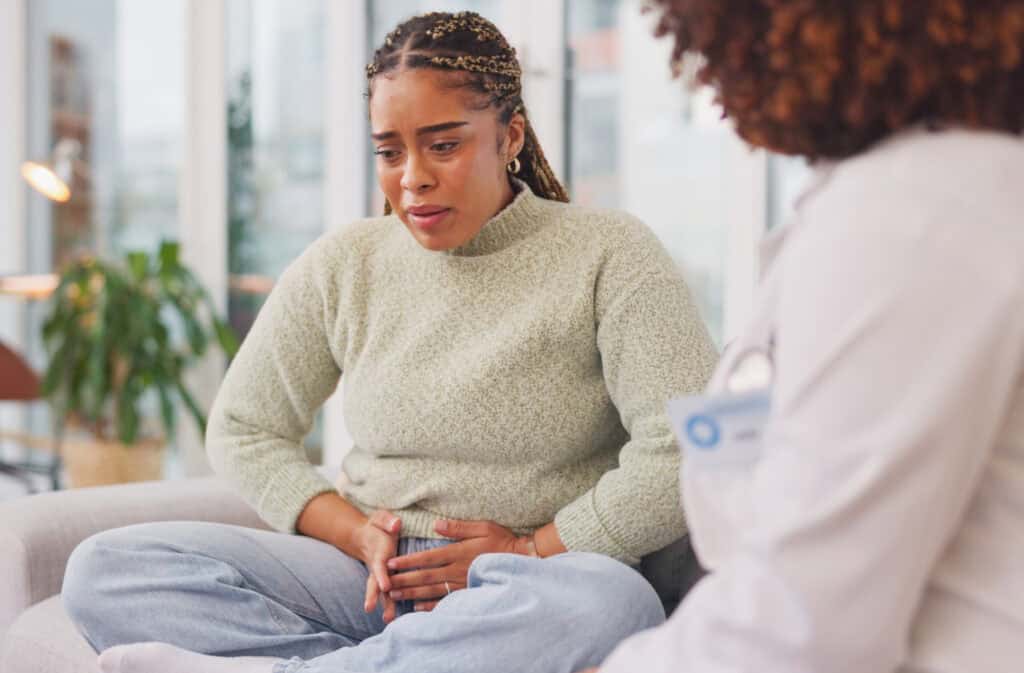
Learn about missed miscarriages, including common causes, symptoms and management options. Understand the causes and how to support your physical and emotional recovery.
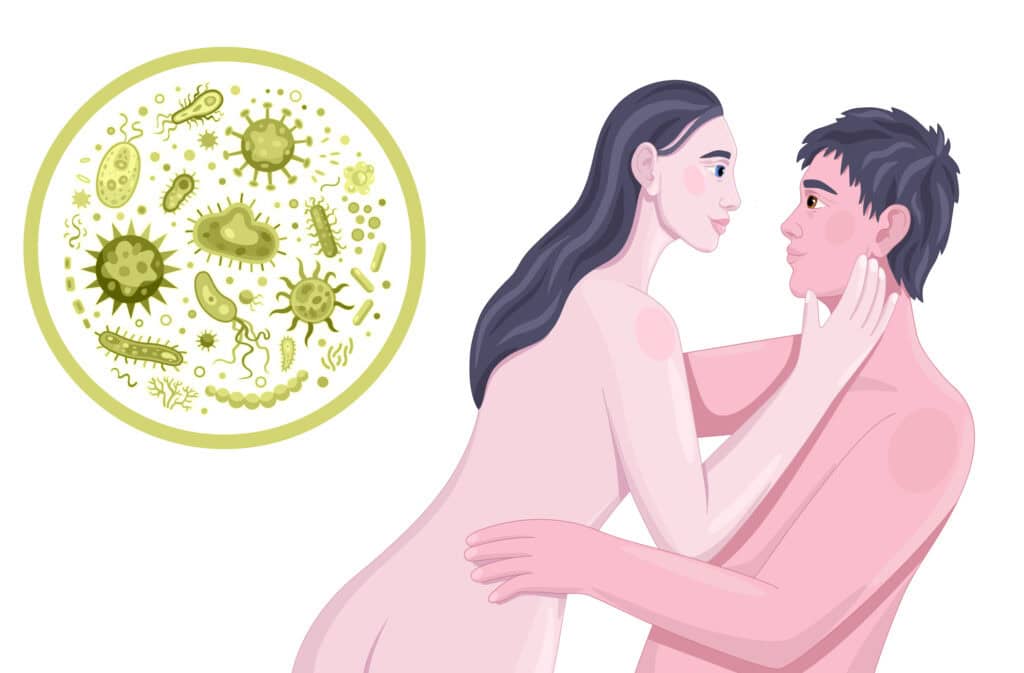
A guide to UTIs covering the basics. Causes, symptoms, and how long do they take to clear up? Plus, the answer to the question can you have sex with a UTI?
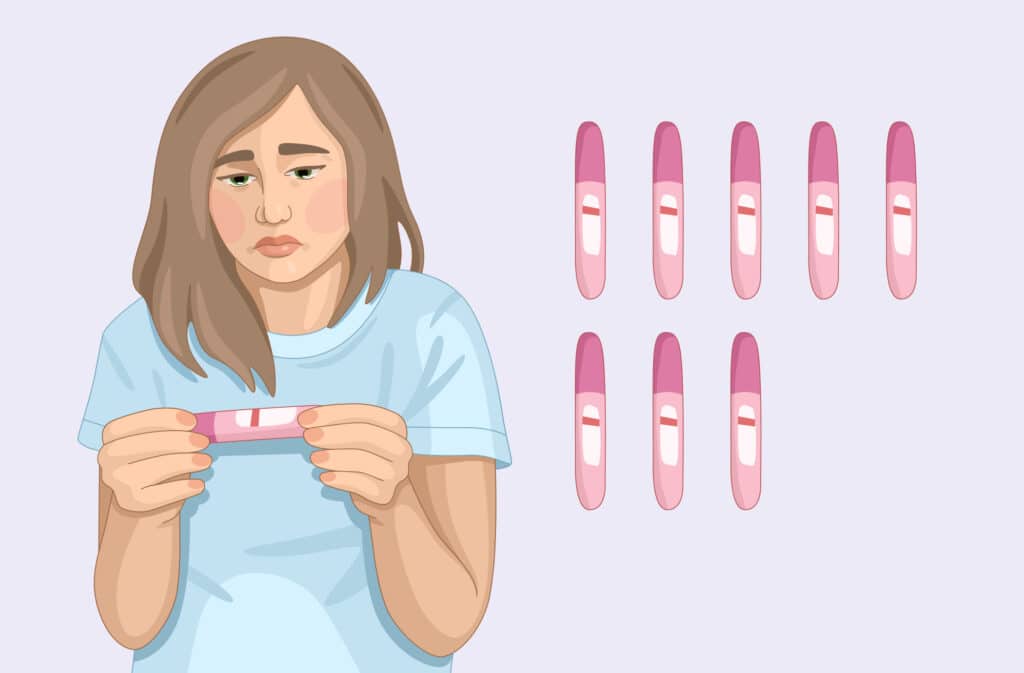
Learn about female infertility, including common causes, how to know if you’re infertile, and what treatment options are available. Find support and guidance for your fertility journey.

